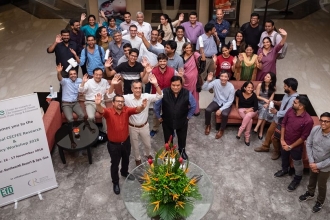
3rd Annual CECFEE Workshop
The Centre for research on the Economics of Climate, Food, Energy and Environment (CECFEE) of the Indian Statistical Institute organized the 3rd annual CECFEE on 17-18th of November, 2017. The…

The Centre for research on the Economics of Climate, Food, Energy and Environment (CECFEE) of the Indian Statistical Institute organized the 3rd annual CECFEE on 17-18th of November, 2017. The…
Manchester, UK, June 25-27, 2019. Sixth workshop immediately prior to the 24th Annual EAERE meetings. [ Accommodations] Forest Collaborative Workshop Agenda Presentations: Conference Introduction…

CECFEE held its 2nd Policy Day on 10th November, 2019 by organizing a discussion on conservation of forest resources and wildlife. The key speaker for this event was Mr. P.Sivakumar, IFS, Director of…

CECFEE hosted its 5th Annual Workshop at the University of Tezpur, Assam. The workshop spanned two days, 10-11 November 2019, and brought together an eclectic mix of researchers and academics. Broadly…

The Center for research on the Economics of Climate, Food, Energy and Environment (CECFEE) of the Indian Statistical Institute, New Delhi, will conduct the 4th Annual CECFEE Research and Policy…

A workshop was organized by the Centre along with the Environment for Development Initiative (EFD) of the University of Gothenburg on October 15th and 16th at Ranthambhore. There were presentations…
A significant portion of the world's forests that are eligible for Reducing Emission from Deforestation and Forest Degradation, known as REDD+, payments are community managed forests. However, there is little knowledge about preferences of households living in community managed forests for REDD+ contracts, or the opportunity costs of accepting REDD+ contracts for these communities. This paper uses a choice experiment survey of rural communities in Nepal to understand respondents' preferences toward the institutional structure of REDD+ contracts.

AGENDA Monday, November 2, 2015 Morning Introduction and Welcome – E. Somanathan About EfD – Gunnar Kohlin, University of Gothenburg Credit, LPG Stove Adoption and Charcoal Consumption: Evidence from…
The mangrove area in Viet Nam is dramatically decreasing in the last decades. Since 1995, mangrove forests in south Viet Nam are allotted and contracted to households for protection, management and logging. Under this policy, households are allowed to convert 20–40% of the allotted forests into other uses, mainly shrimp farming. Most households develop mixed shrimp-mangrove farming systems, in which shrimp ponds are mixed with mangrove forest.